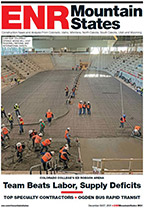2010 Top Specialty Contractors
It’s time again for Midwest Construction to rank the region’s top specialty contractors who work in trades ranging from mechanical, plumbing, HVAC and electrical, to excavating, concrete work, fire protection, demolition and glazing.
This year, we’ll lead off with an overview of current conditions in the industry and thoughts from some of the ranked companies about how they continue to deal with the economic downturn.
Ed Sullivan, vice president and chief economist for the Skokie, Ill.-based Portland Cement Association, expects little overall improvement in the economy anytime soon.
Sullivan, who correctly predicted in spring 2008 that the construction industry was heading for a major downturn, says the basic fact remains that job growth drives the U.S. economy, and he doesn’t see much job growth on the near-term horizon.
He says commercial nonresidential construction will remain depressed by an overabundance of space that will take a long time to fill before investors will need to construct new buildings.
Similarly, residential construction and its related specialty contracting work will remain depressed by an abundance of foreclosures, Sullivan says.
Although Sullivan sees federal stimulus money helping launch some larger public projects in the latter half of 2010, he says state fiscal deficits may dampen growth in public projects.
“Any increases will not represent new economic strength, just improvement from dismal levels,” he adds. “It will be hard to prove to the guy on the street that things are better.”
Ken Simonson, chief economist for the Associated General Contractors of America, says construction in the Upper Midwest lags behind the general economy, same as in the rest of the nation.
Simonson says he believes that for the rest of 2010, hospital and higher-education construction will gain momentum, but that the ongoing budget woes of cities, states and school districts will be a major drag on public projects.
In addition, Simonson expects that high vacancy rates for developer-financed projects will hold down retail, office, hotel, warehouse and multifamily construction.
He says that although many of those categories will have touched bottom and begun rising by 2011, stimulus money will be waning and other levels of government will continue to pare construction spending.
As a result, Simonson expects the recovery to be weak at best.
Len Toenjes, AGC of St. Louis executive director, agrees. “Flat is the new up,” he says. “If the economy has stopped falling and things have leveled out, that’s the best we can do right now.”
Toenjes says the economic crisis is transforming the construction industry. “Even when it recovers, the industry is not going back to what it was before,” he says. “There will be more integrated business models, more geographic diversity and a more critical need for contractors to collaborate with the architectural and engineering industries.”
Toenjes says he believes that the other end of the recession will see more large contractors who can do integrated projects, some small niche contractors and fewer midsized contractors. “The middle’s going to start disappearing,” he adds.
Toenjes says that AGC of St. Louis members, including many specialty contractors, tell him that 2011 backlogs do not look good, and so he is expecting next year to be flat.
A number of Midwestern top specialty contractors echo the economists’ and Toenjes’ predictions.
Mechanical and electrical giant EMCOR is headquartered in Connecticut but has 12 subsidiaries in Illinois, Indiana and Wisconsin.


